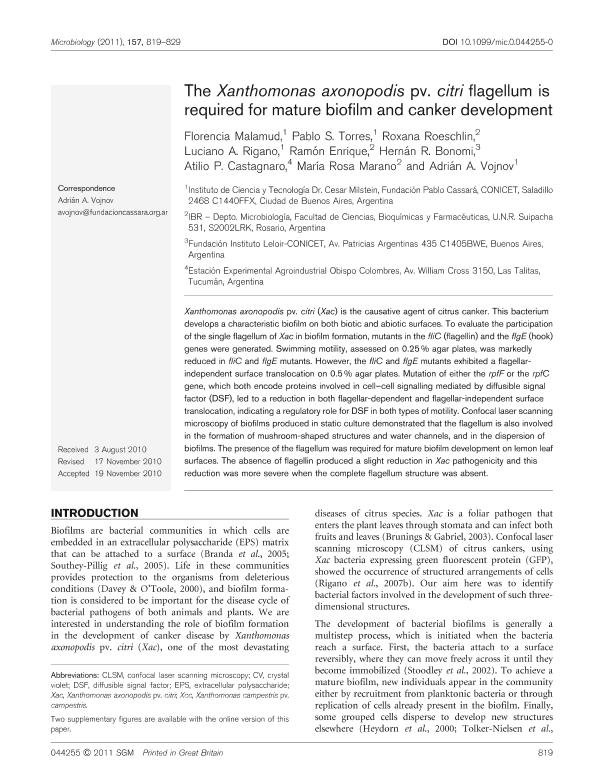Artículo
The Xanthomonas axonopodis pv. citri flagellum is required for mature biofilm and canker development
Malamud, Florencia ; Torres, Pablo Sebastian
; Torres, Pablo Sebastian ; Roeschlin, Roxana Andrea
; Roeschlin, Roxana Andrea ; Rigano, Luciano Ariel
; Rigano, Luciano Ariel ; Enrique, Ramón Atanasio
; Enrique, Ramón Atanasio ; Bonomi, Hernán Ruy
; Bonomi, Hernán Ruy ; Castagnaro, Atilio Pedro
; Castagnaro, Atilio Pedro ; Marano, María Rosa
; Marano, María Rosa ; Vojnov, Adrián Alberto
; Vojnov, Adrián Alberto
 ; Torres, Pablo Sebastian
; Torres, Pablo Sebastian ; Roeschlin, Roxana Andrea
; Roeschlin, Roxana Andrea ; Rigano, Luciano Ariel
; Rigano, Luciano Ariel ; Enrique, Ramón Atanasio
; Enrique, Ramón Atanasio ; Bonomi, Hernán Ruy
; Bonomi, Hernán Ruy ; Castagnaro, Atilio Pedro
; Castagnaro, Atilio Pedro ; Marano, María Rosa
; Marano, María Rosa ; Vojnov, Adrián Alberto
; Vojnov, Adrián Alberto
Fecha de publicación:
03/2011
Editorial:
Society for General Microbiology
Revista:
Microbiology-UK
ISSN:
1350-0872
Idioma:
Inglés
Tipo de recurso:
Artículo publicado
Clasificación temática:
Resumen
Xanthomonas axonopodis pv. citri (Xac) is the causative agent of citrus canker. This bacterium develops a characteristic biofilm on both biotic and abiotic surfaces. To evaluate the participation of the single flagellum of Xac in biofilm formation, mutants in the fliC (flagellin) and the flgE (hook) genes were generated. Swimming motility, assessed on 0.25% agar plates, was markedly reduced in fliC and flgE mutants. However, the fliC and flgE mutants exhibited a flagellar-independent surface translocation on 0.5% agar plates. Mutation of either the rpfF or the rpfC gene, which both encode proteins involved in cell-cell signalling mediated by diffusible signal factor (DSF), led to a reduction in both flagellar-dependent and flagellar-independent surface translocation, indicating a regulatory role for DSF in both types of motility. Confocal laser scanning microscopy of biofilms produced in static culture demonstrated that the flagellum is also involved in the formation of mushroom-shaped structures and water channels, and in the dispersion of biofilms. The presence of the flagellum was required for mature biofilm development on lemon leaf surfaces. The absence of flagellin produced a slight reduction in Xac pathogenicity and this reduction was more severe when the complete flagellum structure was absent.
Palabras clave:
Flagellum
,
Biofilm
,
Xanthomonas Axonopodis Pv Citri
,
Cancrosis
Archivos asociados
Licencia
Identificadores
Colecciones
Articulos(CCT - NOA SUR)
Articulos de CTRO.CIENTIFICO TECNOL.CONICET - NOA SUR
Articulos de CTRO.CIENTIFICO TECNOL.CONICET - NOA SUR
Articulos(IBR)
Articulos de INST.DE BIOLOGIA MOLECULAR Y CELULAR DE ROSARIO
Articulos de INST.DE BIOLOGIA MOLECULAR Y CELULAR DE ROSARIO
Citación
Malamud, Florencia; Torres, Pablo Sebastian; Roeschlin, Roxana Andrea; Rigano, Luciano Ariel; Enrique, Ramón Atanasio; et al.; The Xanthomonas axonopodis pv. citri flagellum is required for mature biofilm and canker development; Society for General Microbiology; Microbiology-UK; 157; 3; 3-2011; 819-829
Compartir
Altmétricas



